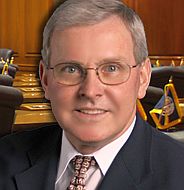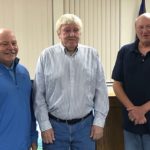 11/15/10 In the most recent “Friend Report” State Representative Bill Friend said, “Over the years, I have written these articles to communicate to the readers about state government and legislation pending before the Indiana General Assembly. My goal has always been to keep the public informed. On a few occasions, I have told you about my conversations with our family dog, Buddy, the golden retriever. Buddy is, and always has been, a great pet for our family.”
11/15/10 In the most recent “Friend Report” State Representative Bill Friend said, “Over the years, I have written these articles to communicate to the readers about state government and legislation pending before the Indiana General Assembly. My goal has always been to keep the public informed. On a few occasions, I have told you about my conversations with our family dog, Buddy, the golden retriever. Buddy is, and always has been, a great pet for our family.”
Buddy seems to have it all: personality, understanding, devotion and an attitude of protection. However, he has a glaring behavioral flaw. Buddy can’t resist chasing vehicles.
Friend continued, “Buddy chose to chase the school bus Wednesday, and he was not successful in his endeavor. The bus struck. He was injured, not killed, but he has to spend some time with the vet. He should recover and return to normal with time and treatment.”
“This real life experience allows me to segue to an old saying, Dogs don’t chase parked cars, Friend said. “I think we can compare this saying to the actions of government and its elected officials.”
He continued, “Parked cars don’t attract the attention of neighborhood dogs. Uninteresting issues don’t attract the attention of the public or the media. Legislative issues need to move to attract attention. Sometimes an issue will move on its own value. If not, a legislator must take necessary actions to promote the issue.”
Often a press conference and press release will be used to start the bill moving. Once it is moving, then the barking and chasing can begin. It’s the noise that calls attention to the bill and helps to educate the public. If people begin to express interest in the bill because of its movement, then the bill can advance because of the public’s involvement.
Representative Friend continued, “Buddy tried to stop the bus from delivering the school kids, and he failed because the bus kept moving. In the same way, people who may disagree with a legislative issue need to understand that they can’t just chase the bus and bark; they need to talk to the bus driver, or in this case the legislator.”
Changing policy for the public may require some chasing and barking. Likewise, stopping a policy change may also require the same energies to be expended. Simply chasing a bill with loud criticism may not be sufficient to stop its passage. But, the effort needs to be expended to demonstrate public participation.
Friend closed this report by saying, “So, here we are: Buddy is recovering. I hope he has learned from his experience. I would like to encourage the public to communicate effectively with legislators when session begins, and as for Buddy – I would like to have him chase parked cars.”














